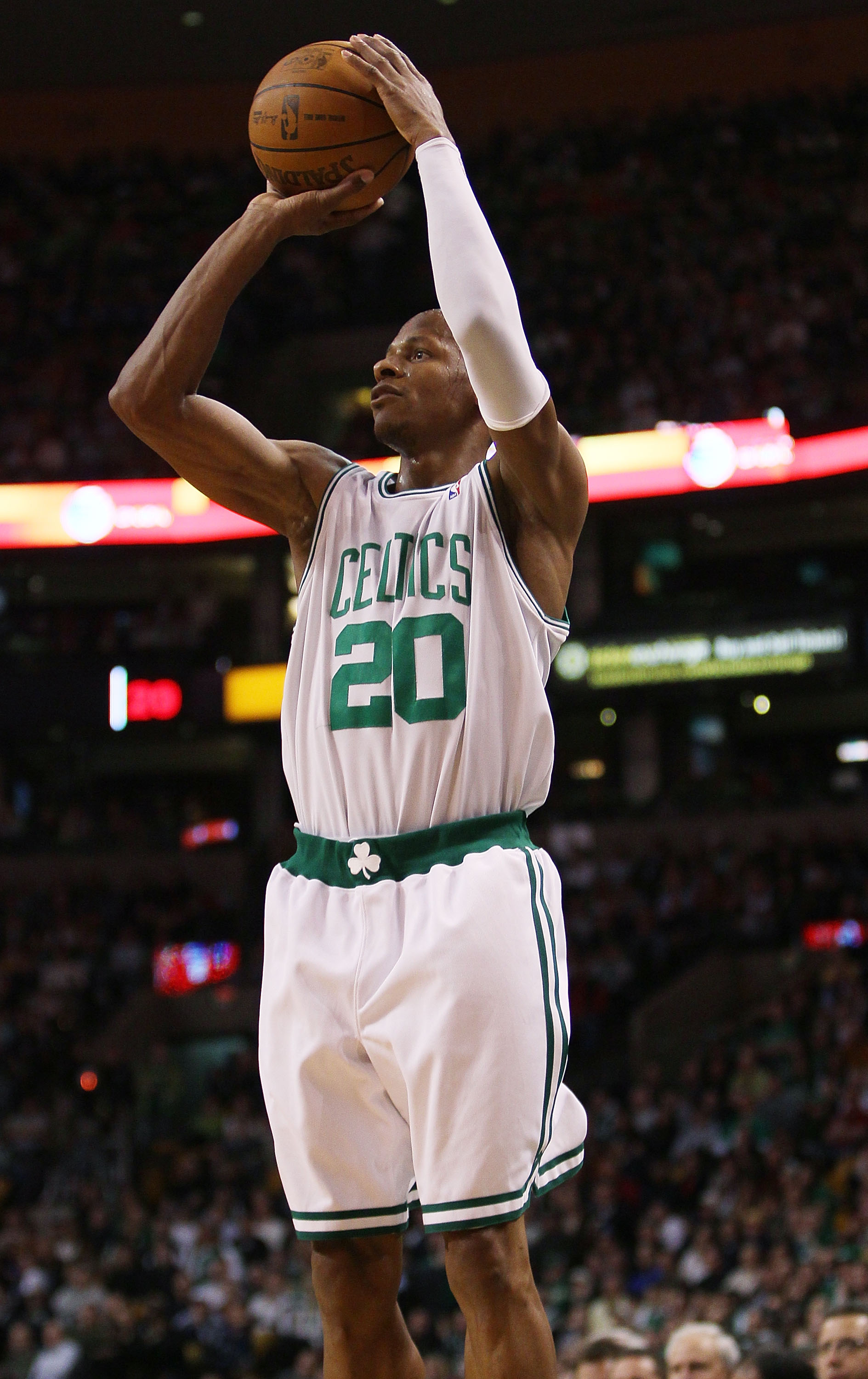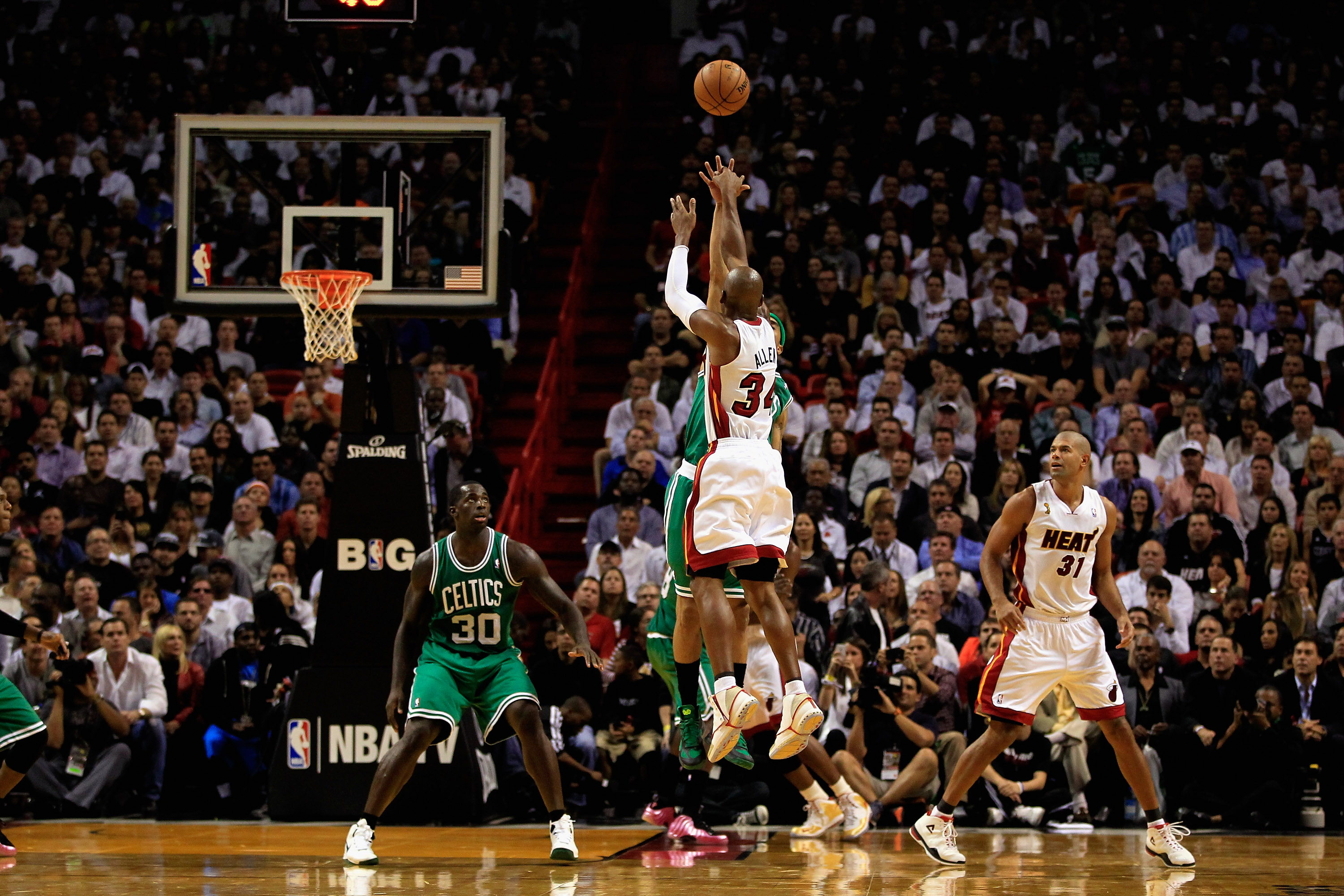Barth: Ray Allen already has his place in the rafters, so why retire his number?
By Alex Barth, 985TheSportsHub.com
Lost in the drama of the Celtics’ Thursday night win over the Clippers was the announcement the team will retire Kevin Garnett’s No. 5 next season. With Garnett joining Paul Pierce’s No. 34 up in the rafters, a recently-dormant Boston sports argument has reemerged in full force…should Ray Allen’s number join them?
In short, no. Here’s why:
Just being a starter on a championship team is not enough to qualify retiring a number. Even if that was the precedent set by the Celtics 50-plus years ago, it doesn’t need to be anymore. Retiring a number should be about two things, legacy and culture. What did that player do to shape the organization, and how is that player remembered are the two key factors to think about here.

BOSTON – MARCH 31: Ray Allen #20 of the Boston Celtics takes a shot in the first quarter against the Oklahoma City Thunder on March 31, 2010 at the TD Garden in Boston, Massachusetts. NOTE TO USER: User expressly acknowledges and agrees that, by downloading and or using this photograph, User is consenting to the terms and conditions of the Getty Images License Agreement. (Photo by Elsa/Getty Images)
What is Ray Allen’s legacy, not as an NBA player but as a Boston Celtic? Even though he won a title in Boston, the first memory that comes up when discussing him is his departure. Before the 2012-2013 season, Allen joined the Miami Heat, the Celtics biggest competition in the Eastern Conference.
This was hardly a case of sports ‘just being a business’ either. It later came out that his deal with the Heat was worth half of what the Celtics had offered to bring him back. In the time since, numerous members of that Celtics team including Pierce and Garnett have described Allen’s departure as unexpected and unsanctimonious. He told no one and said nothing. Simply put, he bailed on Boston.
The year after leaving the Celtics, Allen was a key piece in the Heat’s championship run. If the Celtics were to retire his number, he would be just the third player in the rafters to have won a title after leaving the team, joining Ed Macauley (No. 22) and Robert Parish (No. 00).

MIAMI, FL – OCTOBER 30: Ray Allen #34 of the Miami Heat shoots against the Boston Celtics at American Airlines Arena on October 30, 2012 in Miami, Florida. NOTE TO USER: User expressly acknowledges and agrees that, by downloading and/or using this Photograph, user is consenting to the terms and conditions of the Getty Images License Agreement. (Photo by Chris Trotman/Getty Images)
“Easy Ed” Macauley may not be a household name, but he was “the first Celtics superstar” and was an All-Star every season be played in Boston, from 1950-1956. He was then traded to the Hawks (a trade which netted the Celtics Bill Russell) where he won his only NBA title.
Parish is much more of a recognizable figure, although even some dedicated Celtics fans will forget he was a member of the ‘97 Bulls, playing a limited role in the organization’s middle win of their second 90’s three-peat.
Is Allen, as a Celtic, on the level of the organization’s first stand-out player or a cornerstone of three championship teams? Obviously a lot more goes into retiring a number than what happened after a player leaves a team, but given the Celtics history of success, this is a category that’s worth mentioning.
So back to what Allen did in Boston. What is his lasting impact on the Celtics culture? Is there one at all? While Pierce and Garnett have stayed present and visible around the organization since retiring, Allen has been noticeably absent. Maybe there’s good reason for that, but shouldn’t that also be reason to not hang his number with the others?

CLEVELAND – MAY 11: Ray Allen #20 of the Boston Celtics tries to get around Antawn Jamison #4 of the Cleveland Cavaliers in Game Five of the Eastern Conference Semifinals during the 2010 NBA Playoffs at Quicken Loans Arena on May 11, 2010 in Cleveland, Ohio. NOTE TO USER: User expressly acknowledges and agrees that, by downloading and or using this photograph, User is consenting to the terms and conditions of the Getty Images License Agreement. (Photo by Gregory Shamus/Getty Images)
Part of the reason teams retire numbers is to preserve the legacy of those who wore them. How weird would it be down the road for the Patriots to have some sucky quarterback wearing number 12? Wouldn’t feel right, would it? Numbers displayed in certain fonts and colors are attached to certain memories, and numbers are retired to preserve those memories.
(Which by the way makes the Miami Heat retiring Michael Jordan’s number one of the stupidest things in all of sports. Nobody is going to look at 23 in red, yellow, and orange and think, ‘Oh, MJ!’)
The fact that the Celtics have reissued Allen’s 20 just compounds that point. A new generation of fans is forming mental associations with a block white two-zero. If the organization really felt the fans were attached to that number in a way that deserved retirement, they never would have given it to Gordon Hayward. Now, retiring Allen’s number would be more than just taking it out of circulation, they’d have to strip it from one of the most recognizable members of the current roster. It was strange when the Red Sox had Brock Holt switch from 26 to 12 to they could retire Wade Boggs, imagine the Celtics having to do so with Hayward?
Ray Allen was a great player while on the Celtics, but that doesn’t make him a great Celtic. Winning a championship deserves lasting recognition, but he already has his up in the rafters? Don’t believe me? Take a look…

BOSTON, MA – OCTOBER 28: The Boston Celtics raise 2008 World Championship banner during the 2008 NBA World Championship ceremony before a game against the Cleveland Cavaliers at the TD Banknorth Garden on October 28, 2008 in Boston, Massachusetts.
People seem to forget the championship banners are up in the rafters along with the retired numbers. While the numbers are up there to honor individual players, the banners are there to honor entire teams. That’s Ray Allen’s lasting recognition as a Celtic, being a part of the 2007-2008 championship team. Pierce and Garnett extended themselves beyond that one season and have been woven into the organizational fabric in Boston. Allen split to join a rival.
There’s a saying that goes in part, “we will be judged by our last worst act,” and nowhere is that truer than in the world of sports. Allen won a title in Boston, and for that he should be and has been recognized with the championship banner and his ring. However, his exit left more of an impact on the organization than his play, and that should be disqualifying from being displayed among Russell, Bird, and the rest.
Alex Barth is a writer and digital producer for 985TheSportsHub.com. Any opinions expressed do not necessarily reflect those of 98.5 The Sports Hub, Beasley Media Group, or any subsidiaries. Thoughts? Comments? Questions? Hate mail? Let him hear it on Twitter @RealAlexBarth or via email at Alexander.Barth@bbgi.com.



